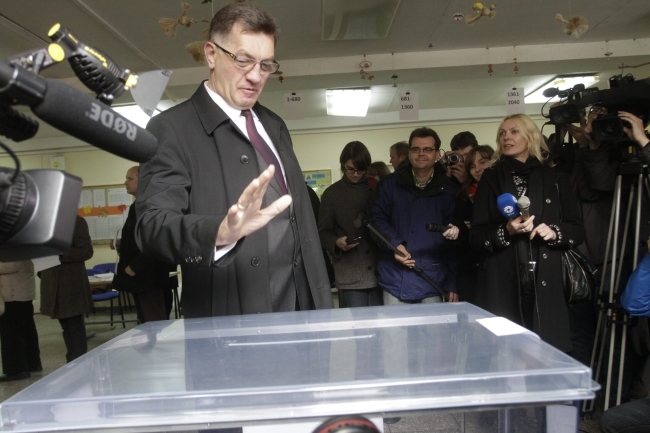
Social Democratic Party leader Algirdas Butkevicius casts his ballot wotes during general parliamentary elections and an advisory referendum on the new nuclear power plant at a polling station in Vilnius 14 October 2012. Butkevicius, the leader of Lithuania's opposition Social Democratic Party, said he was convinced that his party would win 40 mandates in the country's 141-seat parliament. EPA/VALDA KALNINA
“We have been consistently fighting for this result for over twenty years,” said LLRA party leader Waldemar Tomaszewski, in an interview with the
Kurier Wilenski, the principal Polish daily in Lithuania.
“The Polish representation in parliament will certainly strengthen the status of Poles in Lithuania,” he added.
Although the party stood under its time-honoured name, LLRA candidates included representatives from other parties after Tomaszewski forged alliances with Vaidotas Prunskus' Lithuanian People's Party and Russian minority grouping the Russian Alliance.
“We are open-minded, conscientious activists uniting different parties and organizations,” Tomaszewski told the Polish Press Agency (PAP).
Tomaszewski, whose alliance won about 6 percent of the vote, said that it was too early to talk about the eventual make-up of a coalition government.
The two most successful parties were the left-wing groupings the Labour Party (over 20 percent) and the Social Democrats (over 18 percent), who toppled governing centre-tight party the Home Union (15 percent).
However, seats that did not see an outright majority will go to a second round two weeks from now.
“We already have six seats for the forthcoming term,” Tomaszewski affirmed.
“And now, in the second round we are fighting for another six... I think it is absolutely realistic that LLRA will have 9-10 MPs in the next parliament,” he said.
The Polish minority in Lithuania had been at odds with the outgoing government. Problems included reforms that weakened the autonomy of Polish minority schools, as well as disagreements about whether Poles should be entitled to use Polish spelling in official documents. Similarly, Poles claimed that there was bias against them in reclaiming property seized by the communists in the wake of the Second World War. (nh)